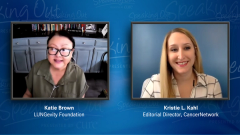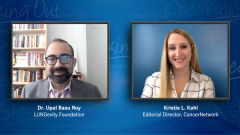
Looking Ahead in Lung Cancer Care
Kristie L. Kahl: Can you discuss the importance of the amount of Food and Drug Administration (FDA) approvals that we saw in lung cancer last year?
Dr. Upal Basu Roy: That's a fantastic question. And as a patient advocate, I was thrilled to see so many different approvals by the FDA last year. And I when I think of the approvals, I think of a couple of different things. First, we saw label expansion, which means that a drug that was already approved by the FDA can now be used to treat another type of lung cancer. And the first thing that comes to mind is using a drug called Tagrisso (osimertinib). For early-stage lung cancer, that was a fantastic approval that we saw.
The other approvals that we saw were in the targeted therapy space, and again, targeting to new biomarkers in lung cancer, the match mutations and the rearrangements, two different types of biomarkers that are found in lung cancer.
And the third group of approvals that we saw last year were lots of different immunotherapy options for our patients. And again, for me, as a patient advocate, when I reflect on all these approvals, I think of more options and more opportunities for our patients.
Kristie L. Kahl: What do these advancements mean for patients?
Dr. Upal Basu Roy: These advances, in my opinion, mean hope, hope for having a better quality of life and hope for a longer survival. And if I were to unpack some of these approvals, I think in the small cell space, what we saw is the approval of a new immunotherapy/chemotherapy regimen for extensive-stage or advanced-stage small cell lung cancer patients. Now, in the early stage, non-small cell lung cancer space, we saw the approval of a drug called osimertinib. For those patients who have a mutation in the EGFR gene, and this is a huge landmark, in my opinion, because in the early-stage space, typically after patients had surgery, the only option that they had after surgery was chemotherapy, and sometimes even radiation. But the approval of a biomarker driven treatment in the early-stage space tells me that we'll be seeing more and more of these treatment options for early-stage patients in the horizon. And we also know that some of these targeted therapies when they're given after surgery, have a much better overall survival than just chemotherapy alone. And lastly, when I think of approvals in the advanced stage, non-small cell space to new approvals come to mind, targeting the RET rearrangements, which again, we see in small and non-small cell lung cancer and approvals targeting MET mutations. And again, for me as a patient advocate, these approvals are incredibly important because RET rearrangements and MET mutations are incredibly rare in the lung cancer community. And what these approvals remind us is lung cancer is becoming incredibly personalized.
Kristie L. Kahl: Why is patient-focused research so important in lung cancer?
Dr. Upal Basu Roy: When we think of research and treatment in lung cancer, I think the research piece is the clinical trials and getting drugs to the market. But what patient-focused research helps us uncover is are these drugs reaching patients. How are patients feeling and functioning on these drugs? And I think these pieces of information are incredibly important for two pieces. First, we can make sure that we can solve the access issue. And secondly, we can also make sure that we equip our patients to live longer, healthier lives on these drugs. And again, keeping in mind that patient-focused research looks at patient experiences outside of a clinical trial setting. And I think that's a key point here, because most of the information that we have about these drugs, is from clinical trials and patient-focused researches are the other side of that coin, giving us real world information about how these drugs impact the lives of our patients.
Kristie L. Kahl: Are there any novel therapies that might not yet be approved. But maybe we can educate patients on?
Dr. Upal Basu Roy: This is an incredibly exciting time for lung cancer treatment and research. When I think of new therapies on the horizon, I think of an incredibly exciting pivotal point in lung cancer treatment, and that's being able to target the KRAS mutation. The KRAS mutation was discovered 40 years ago. In fact, it was one of the first mutations discovered in lung cancer. But to date, we have not been successful in cracking this nut. But that's changing. And we have two very, very exciting drugs, which are looking very promising in clinical trials. And I do see drugs targeting a particular type of KRAS mutation becoming available to patients pretty soon. And again, another drug that's incredibly exciting is a drug that targets a type of mutation in lung cancer. And these mutations are classified under HER2 mutations. And again, HER2 mutations are found in a subset of lung cancer patients and not very common. And again, having a targeted treatment for patients with HER2 mutations is going to be incredibly important, because thus far, the only treatment option these patients have had is chemotherapy, and having a targeted treatment is going to again, give them more treatment options.
Kristie L. Kahl: With all of these advances, why can patients with lung cancer be hopeful moving forward?
Dr. Upal Basu Roy: I think this is a time of hope for lung cancer treatment and research because of the fact that I feel like we've reached a pivotal point in our understanding of the biology of the disease, where we can convert some of this biology into action. And we see that happening right now. The slices of the lung cancer are becoming smaller and smaller and lung cancer is becoming more and more personalized. And this is going to just continue. And whether a patient has non-small cell lung cancer or whether a patient has small cell lung cancer, lung cancer treatment is going to become more and more personalized, where patients will have the option of choosing treatment options that are meaningful to them, and that help them lead healthier and more healthier lives with minimal side effects from their treatments.






